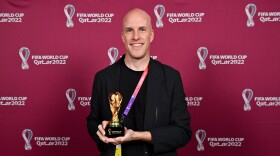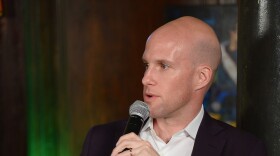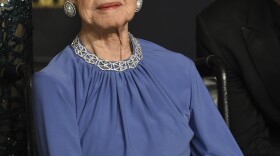
Russell Lewis
As NPR's Southern Bureau chief, Russell Lewis covers issues and people of the Southeast for NPR — from Florida to Virginia to Texas, including West Virginia, Kentucky, and Oklahoma. His work brings context and dimension to issues ranging from immigration, transportation, and oil and gas drilling for NPR listeners across the nation and around the world.
In addition to developing and expanding NPR's coverage of the region, Lewis assigns and edits stories from station-based reporters and freelancers that air on NPR's news programs, working closely with local correspondents and public radio stations. He spent a year in New Orleans after Hurricane Katrina, coordinating NPR's coverage of the massive rebuilding effort and the reverberations of the storm in local communities. He joined NPR in 2006 and is based in Birmingham, Alabama.
Lewis is also a key member of NPR's 'Go Team' — a small group of experienced NPR producers and reporters who respond to major disasters worldwide. He is often among the first on the scene for NPR — both reporting from these sites as well as managing the logistics of bringing additional NPR reporters into disaster areas that lack functioning transportation systems, basic utilities, food, water, and security.
He was dispatched to Haiti after the 2010 earthquake, where he helped manage a group of NPR journalists. He created an overland supply line for the NPR team between the Dominican Republic and Haiti and brought listeners stories about the slow pace of supply distribution because of border bottlenecks. In Japan in 2011, he was quickly on the scene after the earthquake and tsunami to help coordinate NPR's intensive coverage. In 2013, he was on the ground overseeing NPR's reporting in the Philippines in the aftermath of Super Typhoon Haiyan. Covering the impact of the massive earthquake in Nepal in 2015, he field-produced NPR's coverage and also reported how a lack of coordination by the government and aid workers slowed response. Lewis managed NPR's on-the-ground coverage in 2015 of the terrorist attacks in Paris, France, and reported from Brussels, Belgium. He returned to Brussels in 2016 after the terrorist bombings at the airport and metro station. He helped field-produce NPR's coverage and also reported several stories about the response and recovery. In 2018, he went to Indonesia to field-produce and edit coverage following the earthquake and tsunami in Palu.
Lewis also oversees NPR's sports coverage. He spent six weeks in Brazil in 2014 handling logistics and reporting on the World Cup. In 2015, he did the same in Canada for the Women's World Cup. In 2016, Lewis reported and oversaw NPR's team of journalists at the Summer Olympics in Rio de Janeiro. He also led NPR's coverage from Pyeongchang, South Korea, at the 2018 Winter Olympics.
In 2010, the Dart Center for Journalism and Trauma at Columbia University awarded him a prestigious Ochberg Fellowship. The Fellowship is designed to improve reporting on violence, conflict, and tragedy. Lewis has continued his work with the Dart Center and has trained reporters on behalf of the organization in Trinidad and Tobago, the Cayman Islands, and Puerto Rico.
A graduate of the University of Florida, Lewis began his public radio career in 1992 as reporter and executive producer at NPR member station WUFT in Gainesville, Florida. He also spent time at WSVH in Savannah, Georgia, and was Statehouse Bureau Chief at Kansas Public Radio. For six years he worked at KPBS in San Diego as a senior editor and reporter. He also was a talk show host and assistant news director at WGCU in Fort Myers, Florida.
When he's not busy at work, Lewis can be found being creative in the kitchen or outside refereeing soccer games.
-
The January midair collision with the Army helicopter happened as the American Airlines jet was about to land at Ronald Reagan Washington National Airport. All 67 people on both aircraft died.
-
The National Transportation Safety Board says altimeter in the Black Hawk helicopter may have malfunctioned before the DCA midair collision with an American Airlines jet. All 67 people aboard died.
-
Authorities believe there are no survivors in the accident, which happened as a regional passenger jet was attempting to land Wednesday night at Ronald Reagan Washington National Airport.
-
Boeing agreed to buy Spirit AeroSystems, the Wichita, Kansas-based supplier that makes fuselages for the 737 Max jet, in a deal intended to improve quality after a midair door plug blowout.
-
Wahl, the preeminent soccer reporter in the U.S. and a native of Mission, Kansas, died early Saturday while covering the Argentina-Netherlands quarterfinal match in Doha. He collapsed in the press tribune during the game.
-
Grant Wahl, a Mission native, was influential in the soccer world. He was able to break down the most intricate of plays and relate to hardcore and casual fans alike.
-
The top leaders of the U.S. organization say postponement from the planned July 24 opening is best, and international officials should ensure that conditions are safe and fair for all competitors.
-
He had one trip to the moon — not to tread the surface, but to orbit in the craft that would return the two moonwalkers to Earth. All three got in trouble later over the sale of space mementos.
-
Johnson was one of NASA's human "computers" and wrote trajectory equations for missions in the space agency's early days. She was awarded the Presidential Medal of Freedom in 2015.
-
The NBA star, his daughter and seven other people were killed last month. Investigators say the craft didn't have an engine failure. Determining the cause of the crash will take more time.










